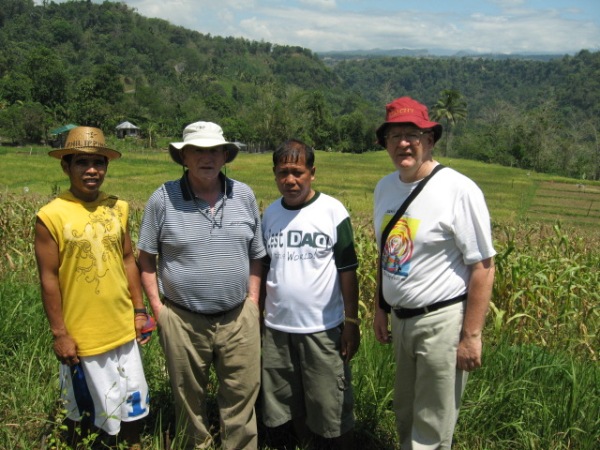Misyon Online - January-February 2010

In the May-June 2007 we published an article by two young Filipino CICM priests in Port-au-Prince, Haiti, Fr Andrew Labatoria from Zarraga, Iloilo, and Fr Edito Casipong of Victorias City, Negros occidental. They and all the CICM missionaries in Haiti are safe, though their Provincial House was destroyed by the 7.0 earthquake that devasted the country on 12 January.
We republish the article here.
We also carry a 'backgrounder' on the history of Haiti by Columban Father Bobby Gilmore in Misyononline Forum.
PULONG NG EDITOR
A Pineapple, A Junk And A Spitfire
By Fr Seán Coyle
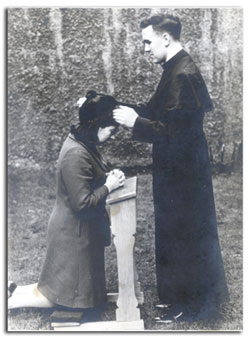 The first book I ever read, when I was 7, was Treasure Island. A map guided Jim Hawkins and his friends to the hidden treasure. God drew a map with clues that guided me to discover the treasure of my vocation during my teenage years.
The first book I ever read, when I was 7, was Treasure Island. A map guided Jim Hawkins and his friends to the hidden treasure. God drew a map with clues that guided me to discover the treasure of my vocation during my teenage years.
The first clue was Sister Gemma in my second year in kindergarten. She spoke about the need to support missionaries and asked us to speak to our parents. My classmates brought in the equivalent of a peso but mine gave me the equivalent of five, a lot of money for them as my father worked as a carpenter on a construction site. Sister Gemma gave me a little calendar with a picture of St Thérèse of Lisieux, Patroness of Missionaries. I didn’t know at the time that the saint would influence me greatly years after my ordination, even though I still don’t like the name she gave herself, “the Little Flower.”
read more>>
About that Sermon
By Fr Patrick G. Clarke
I worked as a Columban missionary in Japan for thirty years. My first parish was a small one in a place called Shingu. Each Sunday when I looked down at my small congregation and began to preach I could see one lady up front who looked up with great expectations in her eyes, waiting for my words...Then as I went on and on...and on, I noticed a body change. She began to list to one side, like a sinking ship and I noticed both her eyes were closed. Then there was Mrs Okada whom I had baptised as an adult. She had a note book and was busy writing down every word I uttered. Then there was this big man in the very last seat who when the Gospel was read, promptly sat down, put his two hands on the seat in front of him and went to sleep even before the sermon began!
read more>>
Blessing Ritual in Brazil
By Bev Trach
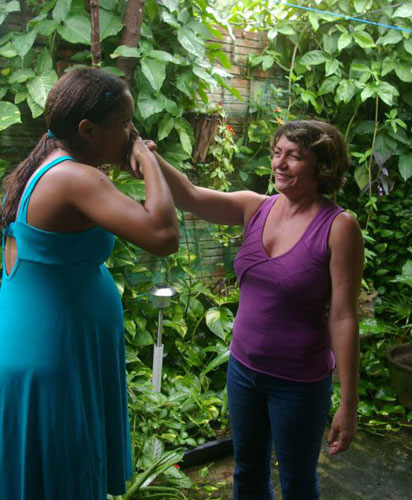 No matter how well life is going, or how difficult things are, there is always a certainty that changes are possible. In my own belief, I know that the one constant is that God is here. There are many churches, books, magazines and speakers that try to help us see that God is present in our lives. Practices and rituals help to remind us of God's presence. Daily prayer, church on Sundays, and a walk through nature is a means that help us to grow in our appreciation of God's presence in our lives.
No matter how well life is going, or how difficult things are, there is always a certainty that changes are possible. In my own belief, I know that the one constant is that God is here. There are many churches, books, magazines and speakers that try to help us see that God is present in our lives. Practices and rituals help to remind us of God's presence. Daily prayer, church on Sundays, and a walk through nature is a means that help us to grow in our appreciation of God's presence in our lives.
Being aware of God's presence is only part of it. Our communications and interactions with God, remain important. In scripture, it is very common to hear of the people asking God for a blessing, either for themselves or for the people they love. God's blessing is a gift.
read more>>
It’s Better Than No Clinic
By Kathryn Boyle
Since 1929 Columban priests have served the people of Our Lady of Remedies parish in Malate, Manila. This was the first Columban parish established in the Philippines and it remains in their care today. Malate is thus, the ‘oldest parish’ in the Columban world.
Today, 25,000 people live within the parish boundaries; 15,000 of these are the ‘urban poor’ who live in the squatter slums, which abound in the areas behind the main streets of the city. Here narrow lanes and alleyways snake through overcrowded dwellings. Here people live cheek by jowl and every inch of space is used. Water comes only from a pump in the narrow alley or from a hose, perhaps once a day. Sanitation is scarce and people live mainly on the street. Here tuberculosis, chest infections and malnutrition are rife.
read more>>
My Brother Kokong
By Elvy Egama-Oliver
Year 2007: The year I wrote ‘Letter to My Brother Kokong’ that was published in Misyon in November-December that year. I had no idea what could be next; all I knew was that the story had never really ended. The letter only concluded with a sad, haunting plea asking my brother to come back.
Being used to God acting rather slowly and thoroughly when it comes to a big ‘request’, I found that the year 2008 would unexpectedly bring an answer and end the ‘fight’. We felt God was rather swift with His answers. But how can anything go wrong with God? We felt exalted and at the same time humbled by His divine justice.
And so this time my article is no longer addressed to my brother, but outside.
read more>>
Pulong Ng Editor
A Pineapple, A Junk And A Spitfire
by Fr Seán Coyle
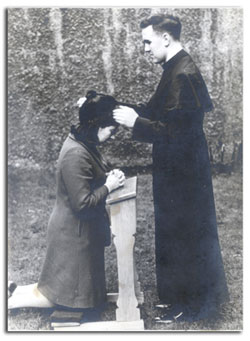 The first book I ever read, when I was 7, was Treasure Island. A map guided Jim Hawkins and his friends to the hidden treasure. God drew a map with clues that guided me to discover the treasure of my vocation during my teenage years.
The first book I ever read, when I was 7, was Treasure Island. A map guided Jim Hawkins and his friends to the hidden treasure. God drew a map with clues that guided me to discover the treasure of my vocation during my teenage years.
The first clue was Sister Gemma in my second year in kindergarten. She spoke about the need to support missionaries and asked us to speak to our parents. My classmates brought in the equivalent of a peso but mine gave me the equivalent of five, a lot of money for them as my father worked as a carpenter on a construction site. Sister Gemma gave me a little calendar with a picture of St Thérèse of Lisieux, Patroness of Missionaries. I didn’t know at the time that the saint would influence me greatly years after my ordination, even though I still don’t like the name she gave herself, “the Little Flower.”
The following year Father Woods came to our school. He was a parishioner but worked somewhere in Africa, which was unimaginably far away for us, a place where the people hadn’t heard the Good News. At least that is what the Sisters told us. I don’t remember a thing Father Woods said but I can still see him sitting in front of us, a fascinated audience, showing us artifacts from the country where he worked.
When I was a child pineapples were very expensive in Ireland and I dreamed of living in a country where they grew. Only after two years in the Philippines did I discover that they didn’t grow on trees! But my childhood dream was all part of the Lord’s gracious invitation.
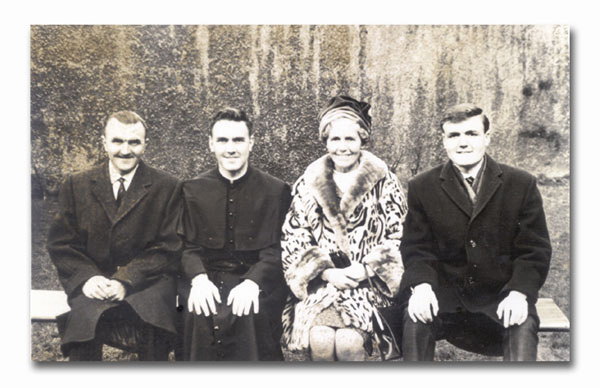
My first contact with the Columbans in kindergarten was their magazine, The Far East. It had a picture of a traditional Chinese boat, a junk, on the cover. That was to take me to my “Treasure Island.”Z
I was confirmed in Grade Four. My teacher, John Galligan, was very proud of his family and always talking about his wife. He once brought her to meet us, the only teacher who ever did that. He also had a great love for the Mass and taught us how to use the bilingual Latin-English missal in those pre-Vatican Two days when everything in church was in Latin. John Galligan, as I realized only years later, had a deep influence on me, as did another John, my father, who went to Mass every day of his life up to the day he died. My Dad didn’t talk about his faith. He just lived it and was the same person with everyone he met, deeply respectful to all.
In high school I tried to go to Mass every day. Often enough, especially on cold, winter mornings, I just turned over and got some extra sleep instead. By this time too I had already begun to see that girls my own age were very attractive. And I wanted to be a pilot, as did all my barkada. We were all strongly under the influence of Biggles, a fictional fighter pilot in the Royal Air Force. We devoured the novels Captain W.E.Johns wrote about him. He flew a Spitfire, a fighter plane that with the Hurricane won the Battle of Britain in 1940. To this day, though I am a pacifist, more or less, I find few things more beautiful than the graceful Spitfire in flight, the closest thing to a bird that man has ever made.
Of that barkada of would-be pilots, two became doctors, one a diplomat and I a priest. During that first year in high school I began to feel the stirrings of an interest in being a priest. And it was always an interest in being a missionary priest. Other countries have always fascinated me and God built on that natural interest which he had put there in the first place.
The following summer, 1957, I got my first job, at a small gasoline station. There weren’t too many customers and I had lots of time to read. I used to bring copies of The Far East and other material about missionaries to work and it became very clear to me that I really wanted to be a missionary priest. I still had four years to do in high school but my desire never wavered, despite the fact that I continued to notice that girls my own age were not only nice to look at but even nicer to be with. The idea of not being with them was the most difficult part of joining the Columbans in 1961. I had decided on the Columbans two years before that. I had shopped around all the missionary groups. Reading the students’ column in The Far East I wanted to be with these young men who were so human, not too much unlike myself. A Christian Brother who taught us, who didn’t know what I was thinking, said to us in class one day, “Only the best join the Columbans.” That encouraged me.
Another factor that drew me to the Columbans was that they had been founded in my native Ireland but were international in membership, with men from Ireland, Britain, Australia, New Zealand and the USA all working together in each country where there were Columbans. That international aspect has expanded and now we have members from Chile, China, Fiji, Korea, Peru, Philippines, Tonga and Vietnam.
The Columbans are secular priests, not religious. I never felt any desire to take a vow of poverty, though I had no expectation that I would become a millionaire either. Nor have I!
Behind all of this was a desire to bring the Good News to people who hadn’t heard it or whose church still needed support from overseas. I had a simple view of things but it was real and I’m convinced that the Lord was speaking to me through it.
The seminary years only strengthened my desire to be a missionary priest. Time and time again my experience as a priest has confirmed that, especially on occasions such as students’ retreats when young people, who so often judge themselves harshly, get an inkling of God’s unconditional and tender love for them. In recent years I find myself repeating more and more to people one of my favorite lines in the Bible, and it occurs many times, “God takes delight in his people.”
Maybe God has called me to be a Columban just to learn that for myself and to tell others about it.
About That Sermon
By Fr Paddy Clarke
Preaching in Japan
I worked as a Columban missionary in Japan for thirty years. My first parish was a small one in a place called Shingu. Each Sunday when I looked down at my small congregation and began to preach I could see one lady up front who looked up with great expectations in her eyes, waiting for my words...Then as I went on and on...and on, I noticed a body change. She began to list to one side, like a sinking ship and I noticed both her eyes were closed. Then there was Mrs Okada whom I had baptised as an adult. She had a note book and was busy writing down every word I uttered. Then there was this big man in the very last seat who when the Gospel was read, promptly sat down, put his two hands on the seat in front of him and went to sleep even before the sermon began!
Priests and Sermons
Priests are often praised for the work they do: Fr A. is great for the sick;
Fr B. loves the poor; Fr C. is great for collecting money etc. How often are Frs A, B, or C praised for their sermons? Rather we are likely to hear sermons being pronounced ‘too long’...’too short’...’boring’...’the priest does not know what he is talking about’ or ‘his sermons are not connected to real life’.
A Priest’s Perspective
Now I would like to speak from an old priest’s point of view. There is truth in what is said about priests’ sermons. However in 50 years of priestly ministry I can say that the majority of priests take their preaching seriously. Nowadays I find most young priests have had better training that we had in communications and I personally enjoy listening to them. However I would like to share a story with you that gave me a new understanding of preaching. Fr Vinnie Power (who was later murdered in Jamaica) told me about listening to a sermon he heard in a church in Tokyo. The priest was preaching on prayer and Vinnie admitted that he found it boring. "He just went on and on" said Vinnie, "until I just tuned him out". As time went on he once again began to listen. Then he did something he had never done before, he began to pray for the preacher. He thanked God for the man’s goodness, for his priesthood and so on. The sermon did not suddenly become better, but something changed in Vinnie. He became more open and he said he was able to listen to the end of the sermon and even get something from it. Praying for the preacher did not change the sermon, but it did change Vinnie.
Ever Tried That?
Before I heard that story I never did. Now I always do. There are all kinds of priests: some have many talents, some have less, but each one is used by God in the service of His people. Their service does not depend on their gifts/talents. It depends on their allowing God to work through them. And when you pray for your preacher, you are allowing God to touch your heart through these very fragile instruments, his priests. Any priest can tell you stories about how God works through his weakness. People sometime come to the priest and say "Father, when you said so and so your words helped me". And the priest says to himself: "I don’t know what you heard, but I know I did not say that because I was reading my sermon..."
Conclusion
So whenever you attend Mass, say a short prayer for the priest as he begins to preach; if it does not change him (and I believe it will) it will help you. Every time each one of us participates in the Eucharist, God has some blessing for each of us. It can occur any time during the Mass - even during the sermon. And if you are helped by a homily, tell the priest. He will be grateful to God and to you; there is little danger he will be conceited.
Fr Paddy Clarke, now retired, served in Japan for fifty years.
Blessing Ritual In Brazil
‘I will pour out my spirit and my blessings on your children. They will thrive like watered grass, like willows on a riverbank.’
By Bev Trach
Bev Trach is a Scarboro Lay Missionary working in Brazil. This article first appeared in the November 2009 Newsletter of the Scarboro Missionaries whose headquarters are in Scarborough, Ontario, to the immediate east of Toronto. Monsignor John Mary Fraser, a diocesan priest of the Archdiocese of Toronto, founded the Scarboro Missionaries in 1918. Some years earlier Fr Edward Galvin, who was to become one of the founders of the Columbans, traveled to China with Father Fraser. A talk that the Canadian priest gave in St Patrick’s National Seminary, Ireland, stirred the interest of a young professor there, Fr John Blowick, who became the other co-founder of the Columbans. Father Fraser was interned in the Philippines during World War II.
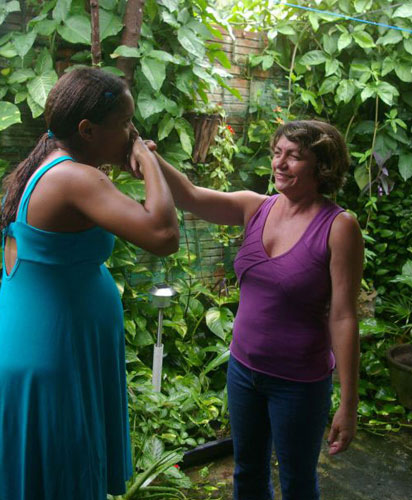
No matter how well life is going, or how difficult things are, there is always a certainty that changes are possible. In my own belief, I know that the one constant is that God is here. There are many churches, books, magazines and speakers that try to help us see that God is present in our lives. Practices and rituals help to remind us of God's presence. Daily prayer, church on Sundays, and a walk through nature is a means that help us to grow in our appreciation of God's presence in our lives.
Being aware of God's presence is only part of it. Our communications and interactions with God, remain important. In scripture, it is very common to hear of the people asking God for a blessing, either for themselves or for the people they love. God's blessing is a gift.
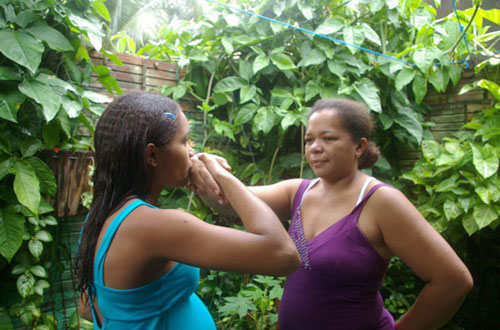
One of the rituals, in Brazil, that I have witnessed on many occasions is that of a child asking their parent/s to invoke upon them God's blessings. It is a combination of words and actions. When children awaken in the morning and during their first encounter with their parent, they will ask the parent for God's blessings. The parent will say, "May God bless you" and at the same time the child takes the hand of the parent as in a handshake, kiss the parent's hand and then the parent will in turn kiss the child's hand, while still holding it.
This same request for a blessing and giving of a blessing may happen between children, siblings, parents, grandparents, God parents, aunts and uncles. This ritual occurs first thing in the morning, before the child goes to school or work, when they return home and before they go to sleep at night. In many cases, it happens so quickly that it may go unnoticed to a visitor but if the child forgets, they are reminded by the parent to ask for their blessing. I have also witnessed this being done over the telephone. Following their initial greeting, a request for a blessing is asked before any further conversation takes place.
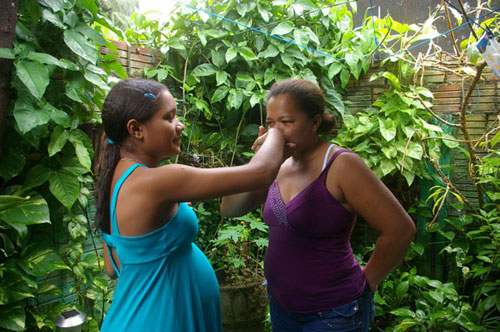
Dyulliana, who is seven months pregnant shared with me that she asks her mother every morning and evening for a blessing. Normally, Lucivania, the mother will bless the baby in the womb by rubbing Dyulliana's belly and at times kisses it. On the rare occasion, that Lucivania does not give a blessing to the baby, Dyulliana said the baby begins to stir and move around a lot. For the two of them, there is no doubt the value of this blessing begins with the beginning of life.
This ritual is not only a reminder of the goodness and presence of God, but also keeps the connection of a child to members of his/her family and their faith.
Father Joeker
By Fr Joseph Panabang SVD
Ceiling is the Limit
I planted mango 27/7/89
One goate died 3/4/90
Adwoa was born 3/4/90
I have discovered that above the ceiling in a Ghanaian house is an archive. No wonder when I would ask one of my catechumens about his date of birth, he would say, ‘I don’t know; our house collapsed’, an answer which at first seemed illogical but now I realize is sensible. Thanks to the cockroaches.
Carry Me?
Like Asians, Ghananians are so hospitable they will do anything for you. Once I was carrying a bucket of water to the bathroom, only six steps away, when my host was coming out of the kitchen. When she saw me she said, ‘Oh no, please Father, let me carry you’. ‘No, thanks, I am too heavy,’ I replied. She laughed with me.
It’s Better Than No Clinic
By Kathryn Boyle
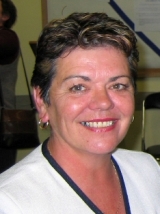
Since 1929 Columban priests have served the people of Our Lady of Remedies parish in Malate, Manila. This was the first Columban parish established in the Philippines and it remains in their care today. Malate is thus, the ‘oldest parish’ in the Columban world.
Today, 25,000 people live within the parish boundaries; 15,000 of these are the ‘urban poor’ who live in the squatter slums, which abound in the areas behind the main streets of the city. Here narrow lanes and alleyways snake through overcrowded dwellings. Here people live cheek by jowl and every inch of space is used. Water comes only from a pump in the narrow alley or from a hose, perhaps once a day. Sanitation is scarce and people live mainly on the street. Here tuberculosis, chest infections and malnutrition are rife.
The social services program of Malate parish have provided some basic health care programs over the years. This was given a boost in 2006 when the Archdiocese of Manila established a fund to provide for a basic clinic in each of the Vicariates (Deaneries) in the city. These clinics are aimed at people in extreme poverty for whom medical care is completely unaffordable. The neighbouring parishes agreed that the local clinic should be established in Malate. It is estimated that up to 75,000 urban poor will be serviced by this facility.
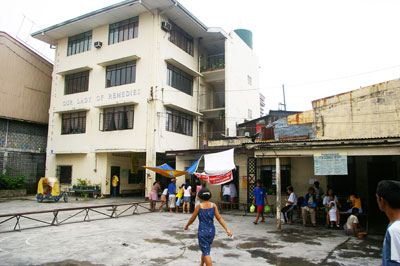
With help from the doctors of the Philippines General Hospital, the clinic was established in a single ground floor room of the Parish centre. It operates five days per week with volunteer doctors and specialists. The focus of the clinic is on prevention: education, immunisation and nutrition. A stringent system of checking that the patients who present for treatment are indeed the extremely needy has been established and is functioning well, all organised by local elected volunteer leaders of the community. Currently between 600 and 900 people are attended to each month. The need has far outgrown the inadequate space where the clinic now operates.
Parish Priest of Malate, Irish Columban Fr John Leydon, hopes to be able to expand and improve this much-needed facility through an extension and renovation of the ground floor of the current building. This extension will provide space to allow for individual treatment rooms, a specialist area for paediatrics, a small day-surgery for simple procedures, a pharmacy and an x-ray facility. Included in the planning is the creation of a garden in what is now the concrete courtyard. The psychological benefit of a green space in this crowded tenement area will be an additional boon to the urban poor.
A volunteer architect has already drawn up the plans for the extension and renovation. What is stopping this vast improvement in the provision of a desperately needed service is the finance to begin the construction. Fr Leydon estimates the cost to be around US$40,000 to upgrade the premises and some additional finance will be required to provide new equipment. The urgency of this project speaks for itself.
MASIPAG And The International Year Of Biodiversity
By Fr Oliver McCrossan
MASIPAG is an acronym for: ‘Magsasaka at Siyentipiko para ang Pag-unlad ng Agrikultura’ (Farmers and Scientists in Partnership for Agriculture Development). The organization began in 1986. It is a farmer-scientist partnership that promotes genuine development of farmers through a pro-poor, sustainable approach. It is working to preserve the rich biodiversity of the Philippines. With over 30,000 farmer-members, MASIPAG’s work proves that even without the use of dangerous GMOs (genetically modified organisms), farmers have a means of producing safe, clean and nutritious food.
Father Oliver McCrossan is on the far right.
The United Nations has proclaimed 2010 The International Year of Biodiversity. Many people all over the world are working to safeguard our irreplaceable natural wealth and reduce biodiversity loss. This is vital for our current and future human well-being. We all rely on the great diversity of life to provide food, fuel, medicine and other essentials we simply cannot live without. Yet this rich diversity is being lost at a greatly accelerated rate because of human activities. This impoverishes us all and weakens the ability of the living systems on which we depend to resist growing threats such as climate change.
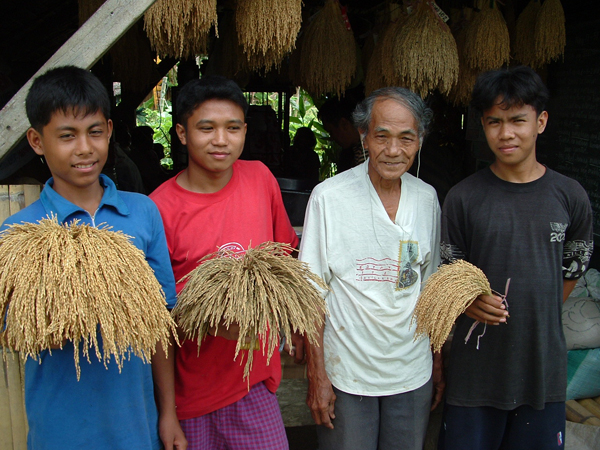
The rich biodiversity of the Philippine archipelago is in grave danger of disappearing. MASIPAG is actively involved in protecting this biodiversity. The Masipag Biodiversity Center (MBC), located in the province of Bukidnon in Mindanao, has this as its mission and goal. The center was opened in October 2005. The total area is 9.5 hectares. Over 600 varieties of native rice collected from all over the Philipppines are being maintained, cultivated and conserved. Native varieties of maize and vegetables are also being cultivated. We are now conserving and breeding our native chickens, goats, pigs and ducks.

Like so many of their sisters and brothers around the world, small farmers in the Philippines face an uphill struggle to survive. In the words of one farmer, ‘When I have paid back my loans for seeds, fertilizer and pesticides I have very little left to feed my family’. Conventional agricultural practices that rely on the heavy use of fertilizers and pesticides have created a polluted environment and left farmers with huge debts. It’s no wonder that so many farming families have left the countryside to eke out a miserable existence in the big cities.
The MBC is actively helping the small farmers of Mindanao to farm in ways that are both sustainable and viable. The aims of the MBC are: the protection and conservation of our biodiversity, to provide a place where the organic farming technologies of our farmers can be displayed and a center for alternative and renewable energy systems.
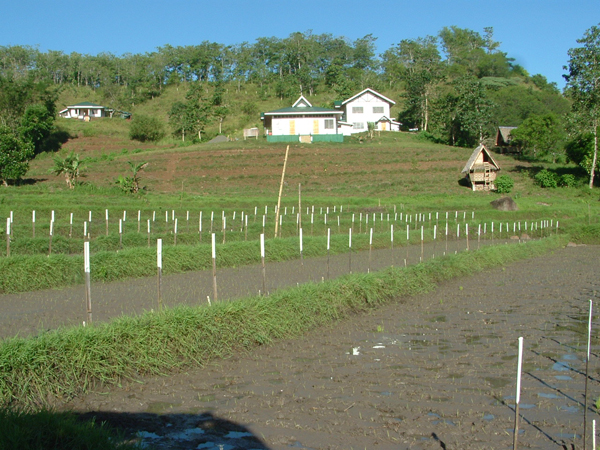
The MBC is a training center for farmers from all over Mindanao and other parts of the Philippines. We have had visitors in recent years from Thailand, Myanmar, China and Indonesia interested in learning about the Masipag farming system.
Climate change is the biggest challenge to humankind today. It is already happening through more frequent droughts, severe storms and other extreme climatic events. The protection of biodiversity of seeds and crops and the development of organic agriculture are important ways to mitigate against climate change. The Masipag Biodiversity Center and farmer organizations all over the Philippines are providing solutions.
Progress is being made. This is not progress created in the laboratories of corporations or in the parliaments of rich countries or in the halls of diplomatic missions: it is progress created in places like the MBC and in the fields of small-scale farmers in the Philippines. This is a cause for hope, not only for our farming families but for all those who care about our world.
Fr.Oliver McCrossan is Adviser to Masipag in Mindanao.
Email address: ollie.mccrossan@yahoo.com.ph
My Brother Kokong
By Elvy Egama-Oliver
Year 2007: The year I wrote ‘Letter to My Brother Kokong’ that was published in Misyon in November-December that year. I had no idea what could be next; all I knew was that the story had never really ended. The letter only concluded with a sad, haunting plea asking my brother to come back.
Being used to God acting rather slowly and thoroughly when it comes to a big ‘request’, I found that the year 2008 would unexpectedly bring an answer and end the ‘fight’. We felt God was rather swift with His answers. But how can anything go wrong with God? We felt exalted and at the same time humbled by His divine justice.
And so this time my article is no longer addressed to my brother, but outside.
When I made the draft of my first article, I wrote it on the feast of St Blaise, 3 February 2007. I did not choose the date, it just happened to be the feast day of the saint. After I wrote the draft of this second article, I looked over as to when I wrote that first one so I could have a point of reference, a comparison of sorts, a kind of measure for the events that transpired afterwards.
It is, again, the feast of St Blaise, 3 February.
Really? Can this be really happening? Was the timing more than a mere coincidence? I do not even know the exact role of St Blaise here; all I know is he is a saint who cures throat illnesses. And all I wanted was to write. So I just left it to God to answer me later.
My letter to my brother ended with the plea, ‘Kuya, please come back.’
God answered for him, and He chose to do it a year later, 2008.
First, father died suddenly of a heart attack, and barely three months later Kuya was arrested and jailed. At first it felt as though God was heedless of our prayers for Kuya’s release, with the ‘hacking’ sound of His divine, uncompromising ‘hatchet’, reverberating through our entire beings. One blow after another, leaving us gasping for the right words to speak of everything. We could only stare at each other, my closest sister and I. Words uttered were not just right, or so it seemed. It was only in the silence of our hearts that we could really understand. We were witnessing the unfolding of God’s divine justice.
All the events happened so swiftly that I had to sit down in order to think through it all, as I tried to piece all of it together. When things began to settle down I realized I was too wide of the mark in the way I thought of how God did everything.
After my brother’s sudden arrest and imprisonment we began to understand why Papa had to go away first. With deep gratitude we realized that he had been spared the pain of seeing the only boy in the family handcuffed, swiftly sentenced by a judge, and jailed. We were spared this heart-wrenching sight too as only close relatives were there to witness the tearful event because of the sudden changes in schedule that made it impossible for us to be there on time. Honestly, I had asked God why He would not allow me to witness this when I could bear it, or so I thought. Only later I realized I was too presumptuous and might have fainted had I been there. Since God is always the better judge, I relished the consolation that He had very good reasons for sparing us after all.
On Papa’s death? While still waiting for the future of my wayward brother to grow bright, the good Lord took my silently agonizing father to eternal bliss. He was only 68 years old, fit and trim. Too early maybe, but we were relieved that his pain had finally come to an end. Papa’s face, as I stood beside his cold body at the morgue, was so calm, so light. There was even a faint smile on his lips. I managed to utter only two sentences before tears fell, ‘Your journey is going to be good, Papa,’ and ‘God has forgiven you’.
Thinking back, I can only marvel at how God swiftly did everything since I was accustomed to Him acting in a so-slow manner, glaring at Him in impatience whilst praying and wondering why He seemed so slow. Was God ‘extra’ favorable to my family? I am tempted to spiritually brag. Whatever His reasons, He sure did it so swiftly. Had Papa, near to God already, made such a good impression on Him that this big favor was granted us? Whatever the reason, my father was a good man and may be gathering the spiritual riches he had stored in heaven. And we, his family left, are benefiting.
My brother’s final sentence was something we knew could happen, though we did hope it would be an acquittal. But God cannot be mocked, justice must be served. And so when we finally learned of the sentence, we knew the fight was all over. God had finally acted.
What consoled us was that, at least, Kuya may have lessened his time in purgatory by already serving part of it here on earth. A pain that is a relief, a penalty that is also a grace.
Once, reflecting about my brother’s fate while on my way to work, I silently asked God what we could look forward to. A vehicle then passed by and painted on its side was a picture of a soaring eagle and a Scripture reference: Isaiah 40:31. I noted the particular passage and looked for it in the Bible. It says, ‘But those who trust in the Lord for help will find their strength renewed. They will rise on wings like eagles; they will run and not get weary; they will walk and not grow weak’.
Reflecting inwardly, I knew the passage referred to the future, especially the future of my brother. It gave me tremendous relief because the Holy Spirit, who is the source of the inspiration, never lies. I may not fully understand yet what the passage has in store for us, but knowing that the Lord had answered my silent prayer was enough assurance of His consistency, that
He is ever watchful, ever loving, ever merciful, and that He is taking care of my brother.
It will be some time before Kuya will be finally free, and we earnestly hope that it will not be time wasted, because it is our prayer that during his prison term he will have a full conversion. And though the fight may be finally over, yet we know that the journey never ends until everything rests in God.
You may email Elvy at wisdom_0917@yahoo.com .
Our Cover Story

Our cover captures the lively waterfalls in the hidden paradise of Bauko, Mountain Province, Philippines, waiting to be discovered and to be shared. It is likened to the Word of God that continuously flows in the deepest recesses of our hearts, even in the most barren of souls, also waiting to be discovered, to be recognized and to be shared with others.
The verse from Isaiah 44:3-4, ‘For I will pour out water on the thirsty soil, streams on the dry ground… they shall grow like grass where there is plenty of water, like poplars by running streams’ is a promise of new life through the Word of the everlasting God, the supreme Source of all Goodness. Let flow the living water in us so we will never go thirsty.
Looking back on the year that was, what are you thirsty for? What is God’s invitation for you to live by in this new year?
Witnessing To Hope In Haiti
By Fr Andrew Labatoria CICM and Fr Edito Casipong CICM
Father Andrew Labatoria, from Zarraga, Iloilo, joined the CICMs in 1991, and was ordained in 2003. Father Edito Casipong, from Victorias City, Negros Occidental, joined in 1986, and was ordained in 1998. They currently work as the founding pastors of the first CICM parish in Port-au-Prince, the capital of Haiti.
Haiti experienced a particularly turbulent time in 2004 and 2005; the country was on the brink of economic and political breakdown, and still is today. There is a hopelessness here that runs incredibly deep. In desperation, many people turn to violence, vandalism, the burning of government owned buildings, vehicles and such. The black smoke we see rising above our city doesn’t indicate another inconclusive vote in electing a new pope – it simply indicates more violence.
However, amidst and in spite of the uncertainty here in Haiti, we set out to form the Christian community of St Jude, which, early in 2005, the bishop had entrusted to us. The place has yet to be elevated to parochial status, but it would be our first CICM parish in the capital. The community is comprised of migrants from different provinces who have come to the capital in the hope of finding a better life. The community is growing and current estimates put the present number at around 60,000 people. When we examined where these people were at that moment, we saw enormous needs and an enormous task ahead.
Drawn Out Dream
The community of St Jude had previously been under the care of the Parish of St Claire. With donations from concerned organizations and generous individuals, the community was able to lay the cornerstone for their own St Jude Chapel in 1999. Along with this milestone, the residents of St Jude were able to obtain electricity and a water supply from the government as well. However, with their limited budget, building the chapel stretched into a years-long project. The lack of funding and the deterioration of the political and economic climate took a toll on the entire project and community; the construction of the chapel eventually came to a complete halt.
For years, the Christian community of St Jude has celebrated the Eucharist, received formation and prayed together in an open structure that serves as church, hall, community building and parish office. The journey of St Jude as a faith community has not been an easy one; but it progresses.
Reawakening
Ever since we came to the community of St Jude, we’ve received enormous support and collaboration from the people. The newly formed pastoral groups are becoming active in building a solid and lively Christian community and a parish council has been formed. After some months here we had our first baptism. Since then we’ve celebrated the Sacrament of Baptism for some 150 children and adults. Thirty or more adults have received First Communion and registration for youth and adult catechism has increased significantly. A series of religious and social formation sessions have been organized and well attended. Participation by every parishioner is constantly requested and the response gives an air of excitement to this growing faith community.
‘Anpil men, chay pa lou’, is a Haitian proverb meaning: ‘With many hands, the load becomes lighter’. This sums up the situation at St Jude. Though their efforts to construct a church building were thwarted, the Christian community’s persistence and faith has enabled it to continue to grow and become a vibrant one. They’ve demonstrated well the proverb’s message of hope through sharing and partnership. It is only possible because of the tireless devotion of many lay leaders and collaborators.
Today, with the vision of elevating St Jude to a parish, there is even more enthusiasm and hope among the faithful. The dream of finishing the church construction has once again awakened.
Enduring Hope
Sadly, another Haitian proverb is not far from our minds as we pursue this dream. ‘Deye mon, gen mon’, ‘Behind mountains are more mountains’, captures the grim reality of life here in Haiti. The struggle for development and a peaceful society is ongoing. But it is amidst such uncertain times that the call to evangelization becomes louder and more necessary. It remains a primary mission for every man and woman who hears Jesus’ call: ‘Go to all nations and proclaim the Good News.’ This is our call. Founding a new parish in the capital of Haiti during these chaotic times is certainly not an easy task. But it is a concrete witness to our hope in God.
Of course it is our dream to help the community of St Jude go further. We pray that the dreams of the people will be realized, despite the long and slow path they are sure to face. St Jude has already grown tremendously and matured in faith under the Gospel values that teach us that we are all equal partners, responsible to one another.
No doubt the task will be long and difficult, but we shall endure. We have witnessed the simple fact that sharing is one of the most powerful forces in the world, and we thank you for sharing with us in this mission through your prayers and other support. It is our missionary calling to share; we vow not to stop.
Winning Entries For Misyon Student Essay Contest 2009
GRAND PRIZE WINNERS
- 1st Place - MARY MICHIE A. GAMBE, Being Me
- 2nd Place - EIRA CEZANNE BUHISAN, Evangelizing This Digital Continent
- 3rd Place - RONALD LYNDON LORD MEDINA , Bridging Gaps
- 1st - AIRA LHEIZ B. AQUINO, Generation Y
- 2nd - LOUISE PATRIZIA DIZON, 'Evangelizing the Digital Continent'
- 3rd - ANGELICA CHRISTINE C. CALAMAAN, New Technologies, New Relationships
- 4th - KEANU HENRI S. YU, ‘Evangelizing This “Digital Continent”’
- 5th - JUNE EDGAR ASOK, Digitalizing the ‘Word of God’
- 6th - CHARMAINE R. ALMENDRA, My Turn
- 7th - IRENE MAY R. WABAN, There’s Always a Way
- 8th - VANESSA T. DE GUZMAN, My Essay: Evangelizing this Digital Continent
- 9th - MONIQUE LORRAINE E. GALANTO, ‘New Technologies, New Relationships: Promoting a Culture of Respect, Dialogue and Friendship.’
- 10th - GENEVIEVE MARIE LAPINID, In My Own Little Way
10 CONSOLATION PRIZES
**Announcement on Winning Entries**
Being Me, Touching Others And Doing God’s Bidding With Present-Day Technology
By Mary Michie A. Gambe
First Place Winner
The author is a Second Year student in Rosevale School, Xavier Estales Phase 4, 9000 Cagayan de Oro City.
Today’s world is different. Access to even the remotest part of the globe has been made easier and faster. In the past, it was harder to evangelize countries, because of the limited resources, crude communication and travel facilities, language, geographical barriers, and fear.
During the summer of 2009, I and seventeen other girls from different parts of the Philippines, went to Ladian, a rural place situated near the hinterlands of Davao Province, to reach out and teach catechism to the natives. This outreach program was made possible and greatly facilitated because of technology. All of us were brought together through the text messages of the organizers. Until now, we still keep in touch, planning future rural activities through the internet and our cell phones.
In the past the apostles would travel for days to proclaim the gospel or build churches throughout the land. While both of these methods are still widely employed, modern technology and changes in cultural values have caused radical shifts in the kinds of evangelistic ministry being done today.
People are already embedding their beliefs in songs, movies and books that are laden with Christian values based on the life’s work and examples of saints. And many internationally held concerts by famous Christian composers are being done to spread the gospel. Today’s modern technology allows the evangelist to spread the good news without always being physically present. This is done through media. What is important in this kind of evangelization is that due respect, consideration, and appreciation are accorded to diverse cultures.
When we do our evangelization work there are factors that hinder us sometimes. Travelling, for example, requires money. The lack of money makes it harder to reach out to people because we cannot travel. But through today’s technology we can reach out to people and console them through the internet or through text messages. With all the digital gadgetry nowadays, it is easier to communicate and to be present in thought with people who are in different places.
The media is a very powerful tool of evangelization. However, it can do both harm and good. The media is good when it spreads accurate information fast. It becomes harmful when people use it for their own selfish reasons. Regarding gadgets on the other hand while they help make our work load lighter because of their ease and facility, the downside is that the better gadgetry there is, more people get hooked to it. The young who are hooked to the Net spend less time doing things that need to be done such as studying and doing their respective responsibilities at home. There is also less personal interaction among family members when people become obsessed with gadgets. This holds true the saying ‘In each action, there is an equal but opposite reaction’.
The most crucial part in my life as an evangelist is to live by my words and flesh it out into action. I do not have to go to evangelize but I can start where I am, to do what I can. I will do my best to live my life virtuously as a teenager, observing the values of chastity, respecting my body as a temple of the Holy Spirit to exert a positive influence on my fellow teenagers. This, for me, is the true essence of evangelization. Before we can spread it to the world we must start with ourselves by living out our faith not only in words but more so in action. In other words, I have to ‘walk my talk’.
I must always try to be there for people by consoling them. It would be easy to tell people about God when they see God in me, through the things I do. I must always remember that the decisions I make can affect other people, therefore, I must choose wisely what I do and say. By showing people that I care, I hope to leave an impression that God cares for them. This impression would surely last a lifetime.
With a strong faith in God as my weapon and my shield, and the Bible as guide, I am strengthened and confident that nothing is impossible. There are still many places in the world where people are suffering, waiting to be saved. Let us spread the good news and conquer the world with the goodness of Christ by utilizing the gifts of present day technology.
Evangelizing This Digital Continent
By Eira Cezanne Buhisan
Second Place Winner
The author is in Fourth Year-OLFA at Christ the King College, Gingoog City, Misamis Oriental.
In the past years in this living world, existed a perfect harmony in nature. Living was so fascinating as evident in the blooming of the flowers, in the breathing of the animals, in the rushing sound of river-flow and in the gliding of birds in the sky. There was equilibrium in our air, water and land resources.
Nevertheless, because of the never-ending changes in this world, life in the past is now just a picture of beauty and tranquility. Everything happens because of the people who are becoming more materialistic so that the responsibility for and tasks in nature are forgotten and neglected. Some people use this world for their advantage and forgot to act as stewards of Mother Earth. Many people are not content with their own way of living. They cannot live without destroying our world, our Mother Earth. They use our world for their own advantage. Consequently, we live our lives in foolishness. We are so overwhelmed by our power to think and to utilize our Mother Earth.
Can’t we see these affects? Are we going to continue our wrongdoings? Will we never see the future smiling back at us?
‘Evangelizing This Digital Continent’ is the essence of creation spiritually. It is the realization of the truth that all things in this world come from only one Creator, our GOD. We should learn to appreciate the beauty of nature, but we should not overuse nature.
We are given the power to rule over this world and the responsibility to use it properly and to take care of it. People should have a deep realization of the truth that we depend on. It is our task to maintain it. There is a saying that goes ‘YOU TAKE CARE OUR WORLD AND IT WILL TAKE CARE OF YOU’.
Technologies help us very much. As teenagers we need to make better use of websites, e-mail newsletters, blogs, and other way just to reach out our faith to God. And we need to contribute and share our opinions by having comments or suggestion to the site. Just to ensure that we really participate and help one another to reach our goal. That is to ‘be a good role model’.
We need to use the latest media technologies to ‘Evangelize This Digital Continent’. Prior to the recent visit of Pope Benedict XVI to Austria, the Archdiocese of Vienna provided a free service via mobile phone offering excerpts of the Pope’s sermons and writings. The London-based The Timesnewspaper reported that Churches Advertising Network bought an ‘island’ on the popular internet site called ‘SECOND LIFE’. And also many services are already available for the Bible that will deliver daily prayers, ring tones, and photos to mobile phones. Religious video podcasts are also available.
A number of Christian social sites now exist, where believers can have social contact without having to immerse themselves in sites where all sorts of morally content are present. Since announcing the Good News to people formed by a media culture requires taking carefully into account the special characteristics of the media itself, we now need to understand the internet. The internet’s offers many advantages, such us direct access to spiritual resources along with the capacity of overcoming distances. It thus offers the Church new possibilities for communications.
Therefore, these communications should be characterized by truthfulness, accountability, and sensibility to human rights. We must use the potential offered by new communication technology in carrying out our mission, At the same time, we need to keep firmly in mind, that for all types of media, Christ should be both our model and the source of the content we communicate.
We should become stewards of our world especially of our environment and technologies. As to how we are going to do it, it is not simple but it is going to start with a single meaningful word: ‘ACT’. Looking at the positive side will give us a chance to think better. This is a big challenge, yet a great opportunity for us to show our love to our world. We are the hope of the next generation. Let us make them see the beauty of life by taking care of our Digital World so that we will then be able to put a smile on their faces...
Bridging Gaps
By Ronald Lyndon Lord Medina
Third Place Winner
The author is in Fourth Year - St Magdalene of Canossa at Canossa Academy, Lipa City, Batangas.
Does a huge number of online-society friends mean that one really has THAT number of friends? I don’t think so. It is not uncommon for us to add up as many persons as we can as our online friends just because of their face value. This is a misconception about online societies – that authentic friendships come with the higher number of friends. People today do not understand that these societies are gifts giving us the opportunity to have genuine dialogues, and thus, genuine friendships.
Whenever I think of genuine friendships, I always remember my experiences in Hong Kong where I represented our country for the Global Youth Conference. In a week’s span, I formed acquaintances with my fellow delegates, but of course I did not spend all of my available time for them because the conference required lots of careful planning each day. At the end of the conference and before leaving for the Philippines, I had the chance to get the delegates’ contact details. Thankfully, online messengers enabled me to engage in sincere conversations with my overseas friends. It was after the conference that these acquaintanceships involved into authentic friendships.
I find it very relaxing to recall the bonding moments that I had with my friends from Hong Kong. One distinct experience was the Yum Cha. I was very curious about this tea ceremony because of their display of strange traditions such as cleaning an already-clean eating utensil, tapping two fingers on the table whenever somebody pours tea for you, and other weird actions. I was worried for I had no idea what was going on until a nice, pretty delegate offered to assist me during the ritual. I found out that they do all these peculiarities as ways to show importance to their guests. I found myself taken aback for I realized that even if we have different cultures, deep inside we are alike. We are alike. We are alike in a way that we both show concern and love for others. We both possess the spirit of humanity.
As such, I was very much reminded of Jesus. He broke the norms and did everything to embrace the ‘outcast’ – prostitutes, lepers, the possessed, tax collectors, criminals, and sinners. He was the superman of His time. And thus, I wonder: If Jesus committed all those high-degree acts to embrace all the people that He could, how could He have evangelized if he had had the internet already before?
Honestly, I do not know. Still, thinking of this gives me inspiration on how I could be in this time and age. I’d like, in my little ways, to use this gift of technology to bridge the differences in nations and religions. I could never forget the articles that I read and the videos that I saw in the internet about children caught in conflicts in the war-torn areas of Mindanao. I do not see the war as an issue of religion. What I saw was a war caused by the failure to recognize the love embedded in the meaning of humanity. I admit that enacting solutions is beyond my capabilities as a student, but it is my desire to engage in these issues in a way that I can.
And thus I started making steps towards evangelization through technological initiatives. A member of my school’s catechetical organization, it is usual for my students to share their experiences and to ask advice from me through text messages. And also through text messages, I would listen to them, encourage them, and share my advice and biblical quotes to make them feel God’s love working its wonders. Furthermore, I often write for an online magazine where I share and spread the meaning of humanity, particularly of pressing issues like that of Mindanao and the CARP (Comprehensive Agrarian Reform Program) for farmers. Utilizing online social networks, I post blogs and reflections, and I share inspiring videos, pictures, and websites that would make a reader think of others and their faith. I felt glad every time I get comments from people who share my views - people I do not know personally.
I feel brave enough to say that I, in my time and age, am serving as God’s instrument in evangelizing, in spreading the faith, and propagating the spirit of humanity. I am making sure that I, equipped with the gift of technology, am doing my part to bridge the gaps between nations and cultures. All of these are for their sake, our unity, and God’s glory.
Generation Y
By Aira Lheiz B. Aquino
1st Consolation Prize Winner
The author is in Grade 9 – Sapphire at Don Bosco School – Manila, run by the Salesian Sisters of St John Bosco in Sta Mesa, Manila.
My generation is often referred to as Generation Y. It cannot be denied that on the onset, we live in the age of technological advancements. My generation is the age of technology. Some of us are even more computer-literate that the older ones think.
I had my first taste of it at age three. I can still remember myself enthusiastically pressing the buttons in the controller of our Nintendo video game console. At the age of five, I was introduced to this oddly-shaped box commonly known as the Personal Computer. And now, at age 14, spending hours and hours in front of the PC Screen is one of the things that you will most likely find me doing.
My father, being an IT Specialist, was the one who greatly influenced the ‘techie’ in me. Jumpstart, Paint and Microsoft Office Word were the first applications that I learned to use. They were then followed by Britannica, Encarta, my favorite application, Adobe Photoshop, and Microsoft Office tools like Power Point, Excel, Publisher, Access, and One Note. When I was in fourth grade, I was introduced to the internet.
The internet: eight words, three vowels, five consonants, three syllables. Webster defines it as a large computer network linking smaller networks worldwide. I personally think that the internet is one of the most amazing things that mankind has ever invented. You can attain a whole lot of useful information thus making researching more convenient, entertainment is just a click away, and you can connect to different people from different parts of the globe. But I think that the internet should come with a public warning: this may be the best and the worst thing that exists in ‘tech’ world.
The internet has not only contributed a lot to the advancement of technology. It also gave rise to different cyber crimes. Fraud and identity theft, phishing, and child pornography are only three disturbing crimes that happen online. It was also reported that a number of today’s teenagers are involved in different crimes. I felt really alarmed when I learned about this reality and it really bothers me to know that as my eyes become more open to the different aspects of technology, and as time give rise to more advancement in the future, the worst of internet malfeasance could happen. But more than fear, I felt challenged.
It was about early March 2009 and I was planning out things to do for the summer. That time, I really could not think of something that would make me busy for the two month vacation. Then all of a sudden, a simple idea of making the internet a better place for all came into my head. That was how the Bosconian Cyber Apostolate Project all started.
The Bosconian Cyber Apostolate Project or Cyber apostolate for short is a gathering of Bosconians who are gifted with talents in digital arts and technology. Living out our Bosconian profile, A Bosconian is technically confident, our main goals are: First, to show people who Bosconians are in the internet and to show them the genuine Salesian values that our institution teaches and second, to become an example to other online communities by practicing the proper use of the internet, using it for promoting what is morally good. At present, we are developing our school’s online community.
Our Pope calls us to be responsible evangelizers of today. With this, we can say that young as we may be, the Pope gives us this great responsibility to take advantage of the technological advances in promoting what is good. When we are able to respond to this call, in a way, we become Apostles of Christ. Isn’t that cool? It’s not that easy but I’m pretty sure that you will find fullness in your life if you will just give your 100 percent, doing ordinary duties extraordinarily well in your everyday life.
‘Evangelizing The Digital Continent’
By Louise Patrizia Dizon
2nd Consolation Prize Winner
The author is in Fourth Year, Section St Monica, St Scholastica's Academy – Bacolod, Bacolod City.
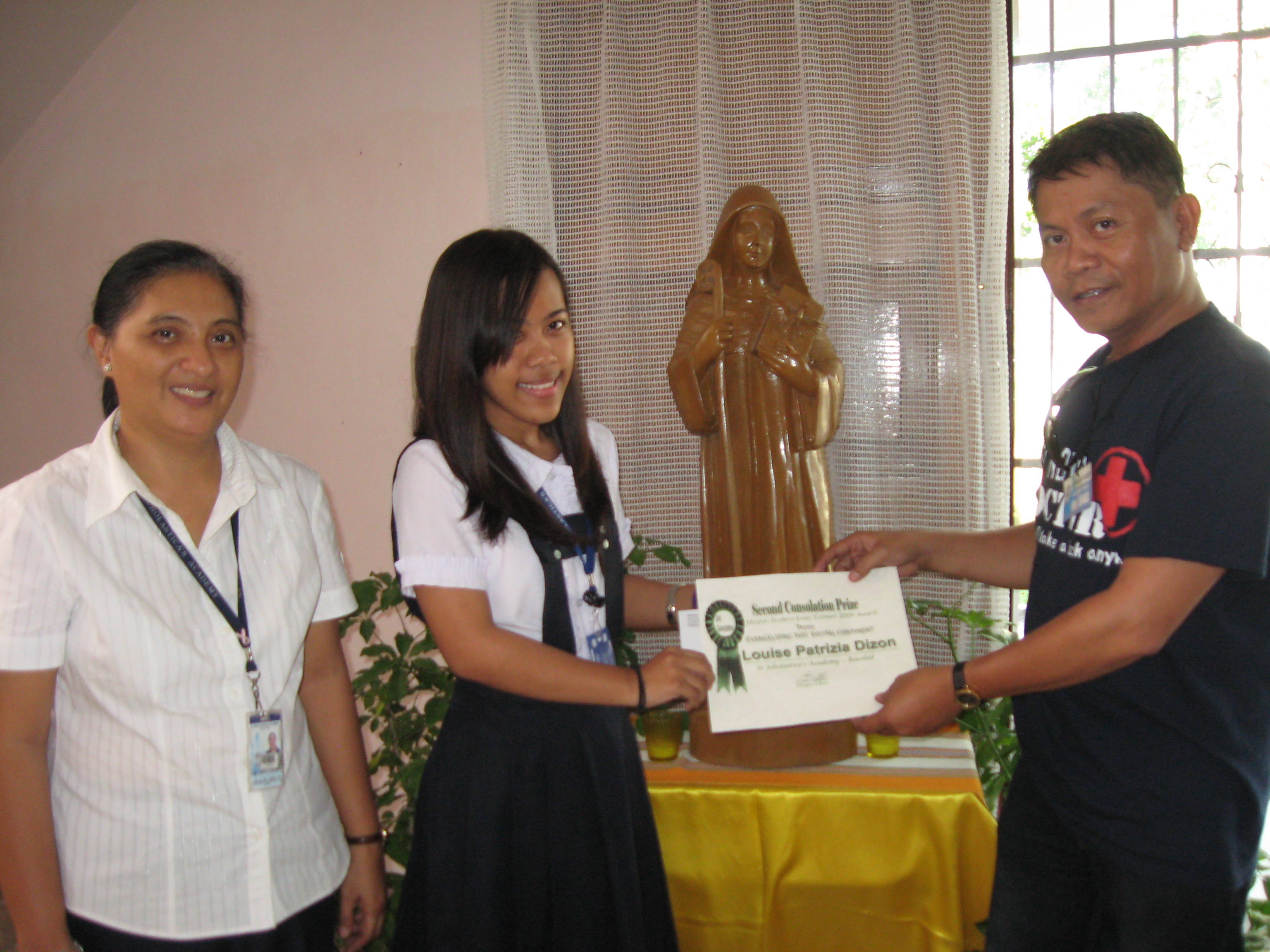
Do you feel incomplete whenever you leave your cell phone at home? Do you panic whenever there is no internet connection? Do you go crazy whenever you can’t watch a TV show due to power failure? Do you ever feel irritated whenever you leave your digital camera at home while on a trip? Well, I guess, I can say that it has gotten normal to feel such feelings whenever we’re ‘detached’ from the different gadgets and other forms of technology that have been playing important roles in our daily lives. Indeed, we’re already living in a world that demands the use of high technology. ‘Digital’ - this is how our generation is being labeled. We are living in a time when we can’t work or carry out tasks without the aid of gadgets. I, for example, communicate with my friends through texting. I also communicate with my parents abroad through texting, phone calls, and even online chat and electronic mail. As a student, I can be better with the help of the fast-search, one-click, easy-access internet connection which paves a broader way for more necessary information about given topics to students like me, also.
All over the world, the demand for higher forms of technology is undeniable. This is because of the fact that the modern world demands a lot from us in order to survive. Let’s be realistic. We cannot have things we both need and want if we do not work for them. We cannot work well without the help of these technologies. Who benefits from these technologies? Actually, the whole world! Everyone can benefit from all the good things the digital world can offer us if, and only if, we use them properly without forgetting our task as evangelists of God’s undying love for all. I personally believe that one good deed leads to the formation of a chain of good deeds.
So, how can we tell the world of God’s love through the use of these technologies? We have already realized from the beginning that these forms of technology have made everything easy and accessible for all of us, so the task of spreading God’s message of love for all will not be as hard as it sounds for us. First, we have to really understand that God’s love for us is unending and it is for all. His love does not choose, so therefore, we too must not choose the ones we’ll help.
Next, after knowing and understanding God’s love for us, we should take time to analyze the situation around us. Know the people who need to feel God’s love the way we have felt it. Since we have already witnessed God’s love, we can now begin to write about our experiences and share it to everyone through blogs and posts in various websites. Not all have the privilege of having computers; we have another option, which requires our willingness and dedication to serve. For example, whenever we roam around the city, we can take pictures of scenes that strike us most. I know none of us are very insensitive enough not to feel a pang of pity when we see homeless families on the streets or old beggars lying along the sidewalks. The pictures that we can capture can be put up on exhibition our schools which will help awaken those who are ‘asleep’.
We can look for websites that help those who have been abused or affected by natural calamities and search on how we can help them too. There are a lot of ways on how we can make this world a better place to live in. There are a lot of ways of letting others know how great God’s love for us is. There are a lot of things we can do in order to evangelize this digital continent. Evangelizing the digital continent is one huge task, but if we start it now and set ourselves as role models to others, together we can see the change we want to see. Every person will find meaning in everything he/she does in this complicated world. Every person will soon slowly realize that he/she lives not for himself or herself alone but also for others. The modern-day technologies are not intended to destroy the dignity of other people. We should always remember to use them in a way that can benefit people and not destroy them.
So, what are you waiting for? Go and make use of the privileges offered to you by this digital world. Prove that you are worthy of these privileges made possible through God’s gift of knowledge and skills.
Digitalizing The ‘Word Of God’
By June Edgar Asok
5th Consolation Prize Winner
The author is in Fourth Year Section Einstein in Iligan City National High School (ICNHS).
I have a friend who is a net fanatic and always updated to the newest gadgets in town. He also owns numerous social networking sites accounts. Despite his obsession with web surfing and online gaming, he knows how to moderate himself, such as not going home late and not spending too much money on the net. And at the same time, this friend of mine is very religious, a diehard Catholic. This can be reflected in his Friendster’s layouts and backgrounds, in the messages he sends to his friends through e-mail, and the way he talks. And as an active Youth for Christ member, he is also our ‘preacher’, both on the internet and in real life.
Then as I think about it, I realize that it is possible to unite the liberal digital technology and the much solemn Christian faith as one. The two concepts seem to be in contrast with each other but these two things can be parallel if you are going to harness the good effects of digital technology in spreading the Gospel itself digitally. Then this thing can serve as a great advantage to the Christian faith then. But how can this thing be realized?
Our generation nowadays, which many consider the ‘digital generation’, is liberated enough, especially the youth, in this new digital technology that is rampant in our society at the present time. This can be done with an intense will, enthusiasm and open-heartedness to other people. But not all people are like this? Yes it’s true and the Pope himself looks at it differently. Since he believes that those qualities mentioned are mostly found in the youth nowadays, then he wants to challenge the youth, Catholic youth, to carry evangelization to these modernized lands. This thing was mentioned in his speech in celebration of the World Communication Day. Spreading the ‘Word of God’ especially in this ‘digital continent’ as most people call it, despite the differences in culture, beliefs, religion, and nationalities is not an easy task. In doing this we must consider these various factors.
First you must recognize the pros and cons of the digital continent, and as much as possible stay away from cons. Because of the undeniable rapid development in the advanced digital technology that makes human life much easier in the field of communication, transportation and many more, we can consider this digital continent a blessing. Note that this ‘blessing’ the digital continent offers can be a cause of destruction if used improperly or abused and that is commonly happening nowadays. Youths must deny those bad influences of digital technologies to carry out the Pope’s challenge successfully.
Another thing Catholic youth must consider is their vulnerability and common weaknesses in using digital technology. Youths’ aggressive manners and idealistic minds serve as a common subject in any kind of corruption that may affect the task that they are about to do. But these weaknesses of the youth must not serve as a hindrance to materialize the Pope’s challenge. And as a youth myself, I would proudly take up the Pope’s challenge as my responsibility that is to share, deliver and elaborate the Gospel of the Lord digitally. I must take up the challenge to guide back the lost ones, to cheer up the oppressed and sad and bring hope to the hopeless ones. And as an achiever and a student, I should not let any unreasonable thing suppress my will in doing the evangelization. My family’s economic status will not affect my intense self-confidence, vigorous self-esteem and mental gift to take up one of my biggest challenges in my life, and that is the Pope’s challenge.
And this responsibility loaded not just on me but on all the Catholic youth will not take this as a responsibility nor a challenge, but a mission to accomplish. Expect me with my friend to work hand in hand in doing our own part, our responsibility and our mission regarding the Pope’s challenge. How about you, why don’t you join us?
My Turn
By Charmaine R. Almendra
6th Consolation Prize Winner
The author is in Fourth Year Section Explorer at St Mary's University, High School and Science High School, Mayombong, Nueva Vizcaya.
For fifteen years, I trekked on the path of youth with the other 90 million pairs of feet living in this archipelago. I have seen a lot of the exceptional cultures, beliefs, characters and riches of the Philippines and the Filipino. I have seen the vulnerable, the vindictive and the mocked.
Before, my home was as simple as God wanted it to be. Entertainment could be found in the elegant flow of the river, the butterflies fluttering by and the laughs of innocent children playing under the morning sun. Communication for me was as simple as talking personally with the people I loved. Evangelization was the simple passing of God’s holy words by mouth to the people thirsty for life’s beautiful nature.
In my present generation, that seems to have fade away. Technologies are everywhere. Entertainment can be found in mp3s and PSPs. People communicate through cell phones and telephones. Even pastors use slideshows, LCDs and the internet to preach the Good News.
I, as a youth, am exposed to many temptations brought by this digital age. Cellular phones, internet and play stations influence me. I am exposed to different immoral things seen in the net. Using my phone, I am exposed to knowing other people who may be lacking in proper guidance. Games make me ignorant of the more important things in life - my love for my wellbeing, family, and God.
Paul said, ‘He creates each of us by Christ Jesus to join him in the work he does, the good work he has gotten ready for us to do, work we had better be doing’. ‘To be liable is my creed. To share the sacred word is my duty.’ Once, I was filled with doubt about who God was because I was bothered by problems at a young age. In one of my saddest moments, I was walking near our cathedral when I heard a comforting voice. When I turned around, it was an old friend who was a young as me. Exhausted from school, I shrugged him off. He insisted and led me inside the church. Once there, he told me the way he was discriminated against at school, maltreated by his own drunkard father and busted by his loved one. I was shocked to hear such things but I was able to relate to his miseries because as young as I was, I couldn’t handle my miseries yet. He said ‘Everyone has problems. They are part of our lives and eventually, they will be solved if you have enough temperance and prudence to know what is right or wrong.’ That tête-á-tête showed me that I can also be a good influence like him.
Jesus laid down his life for me. It’s my turn to do the same.
Using the advantages of this digital age, I can reach out other cultures and make a change. I’ll make websites expressing God’s love instead of watching and spreading scandals in networking sites that may ruin the dignity of the ones in them. Instead of texting nonsense jokes, I’ll text Bible verses and inspiring quotes to my friends. Instead of uploading unnecessary videos from YouTube and Metacafe, I’ll make inspiring movies in Windows Movie Maker and upload them. Instead of patronizing networking sites, chat rooms and gaming sites that may damage my studies, my virtuousness and responsibilities, I’ll advocate in religious networking groups on the web and share my beliefs with ethnicities and aid in the healing of people’s degraded dignity. I am aware that cultural barriers and psychological differences may stop me but since I have the moral obligation to help in the welfare of God’s people, I’ll try my best.
I am challenged to be an evangelizer. Being the hope of the future, I have the liability and the freedom to revolutionize mishaps done because of the arrival of the digital age. This may seem a Herculean task, but I believe I can carry on.
But being the child of the Pearl of the Orient, I carry the name of my forefathers so I pledge to be accountable for my actions. I will not subject myself to temptations brought about by the digital age that can destroy my life and my future.
Because of God’s love I was cast out from my mother’s womb. Because of God’s righteousness, I became a man of decorum and of comprehension. Because of God’s mercy, I am a forgiven and cherished man. Now, because of him, I will be better.
There’s Always A Way
By Irene May R. Waban
7th Consolation Prize Winner
The author is in Fourth Year, Section Einstein, at Misamis Oriental General Comprehensive High School, Cagayan de Oro City.
There are changes that took place in our environment as well as our technology today that have great advantages for us, especially those who want to share and spread around the world the word of God. As we compare it with long, long, time ago, we can really never imagine how life would be if no changes had happened.
Before, we the youth, would listen to the long speeches and stories of the preachers that would take for how many hours that would make the whole time, lifeless or what we called ‘boring’. Most of us, the youth, found it hard to listen to because for us, it’s a session that would make no sense at all because it didn’t please us. We want to have fun, to enjoy and to explore with happiness and excitement. We have the energy that we want to use it to have our pleasures.
Having this digital generation today has brought fundamental shifts in patterns of communication and human relationships. It is also a one-way process in teaching the youth about the word of God. It also helps preachers with an easy way for teaching the youth. We, the young people, the youth of our generation, are the most prone to these changes. We are attracted to the new gadgets and new equipment that hunger our pleasure because they are ‘in’ to most of us or the majority.
We, the youth, are fond of sharing things that are just being discovered. We love to share them because we have the will power and energy to do so. I have this friend of mine who really loves to share the word of God to everyone willingly. He is good in handling new gadgets like computers and others and he is using these in spreading the goodness of God. I witnessed how he is willing to let everyone know about God, the goodness of God and what God has done for us. It only proves that everyone can be a good evangelizer of this digital continent.
Our digital generation today attracts the young people, using gadgets in teaching other people about God. Most of the youth today love this for it energizes their spirits. Using these gadgets attracts other cultures to learn and to experience and to feel the presence of God. It is more preferable to use them than standing and having long speeches that tend to lead everyone not to listen and to got bored.
No matter how we shout for God’s word and share it with others, there will always be hindrances. Everything has its limitations and there will be a boundary that would really stop us from doing so. One these is financial problems. Well, it’s a number one problem for everyone especially the poor ones. We could never explore without money. We could never eat without money to buy food. We need money to enjoy and as well to share what God has done for us. Another problem is lack of moral support of our parents and other people. We need someone to push us or to support us in what we do. We need someone to guide us in the right way and in right timing. We can never do what we want if there is no one to be there for us to support of our parents and other people. We need someone to push us or to support us on what we do. We need some to push us or to support us on what we do. We need someone to guide us on the right way and in right timing. We can never do what we want if there is none to be there for us to support, to love and to care for us.
Our new technology today has its advantages and disadvantages. Though it is a great help to us, there will always be a bad effect. It makes us lazier because we depend on it. There are also temptations that would distract us. There are computer games and pornographic pictures and videos. But then, it is the effect of our new discoveries, so better be careful than to be a victim of computer addiction.
Everyone can be a responsible evangelizer of this generation. We are the ones who can choose our paths. It’s our choice and we can never blame others for our decisions. It is a great help if all of us love to share the goodness of God. But there will always be a devil or temptations that would hinder us. We can help each other. If we have the will, there’s always a way.
New Technologies, New Relationships: Promoting A Culture Of Respect, Dialogue And Friendship
By Angelica Christine C. Calamaan
3rd Consolation Prize Winner
The author is in Fourth Year Section St Martin at Narvacan Catholic School, Sta Lucia, Narvacan, Ilocos Sur.
Technologies like computer software, cellular phones and the internet, among others, can play a vital role in fulfilling the objectives of the ‘digital continent’. These technologies are meant for good use and thus should promote a culture of respect, dialogue and friendship.
The ‘digital continent’ connotes a society that has totally embraced the convenience technologies have to offer. I further refer to a digital world where technologies have played a major role in development.
For many years, I have always been actively serving the Catholic Church. As a student in a Catholic school, I have these spiritual obligations to fulfill. As such, I go to church every Sunday. I follow the commandments of God. And, I make sure that I am part of all the religious undertakings of the school.
With an ignited interest inside me, I tried to surf the internet and visited websites whose objectives are relatively linked to the advocacy of Pope Benedict XVI on the ‘digital continent’. I even had a chance to read comments of devout believers of Christ as they exchanged ideas about the essence of “digital continent” as a subject of the forum. Despite individual differences, they learned how to RESPECT one’s individuality. In fact, I was impressed when I got to know them interested too in supporting the thrust of the Church. In a way, I also learned the VALUE OR RESPECT and SIGNIFICANCE OF DIALOGUE.
As an active evangelizer of this ‘digital continent’, I will join forums in portals on the internet where I can exchange ideas with others and pose religious topics that may help young ones like me to think about how they can spread the ‘Life-giving Words’ of the Lord. Furthermore, through the use of my cellular phone, I will send inspirational messages and quotes to my family, relatives and friends as well. In a way, I am able to communicate the GOODNESS OF THE LORD to the whole of humankind and establish FRIENDSHIP.
Taking advantage of the technological advances, I am optimistic that I will be able to reach out to other youth. Indirectly, I believe I have been doing this all these years from the time cellular phones and the internet came into existence. I however will continue by creating a webpage that young ones like me can go to and search. I will seek assistance from a knowledgeable person who could help me make a portal where they can participate in forums.
There might be obstacles along the way as I endeavor to continue evangelizing the ‘digital continent’. First, I may find people my age or even older to misunderstand me because of varying cultures. And second, I may not have enough resources to realize the objectives because I am not as privileged as the others.
These technologies however may bring about certain advantages and disadvantages.
The ‘digital continent’, on the one hand may be advantageous in a way. It may build a friendly relationship among people and nations as well. It may further be an instrument in bridging gaps, Lastly, it may be a model in promoting peace. On the other hand, if technologies are not properly used, this ‘digital continent’ may be a ‘breeding place’ of crimes, prostitution and other social problems and thus may create misunderstandings.
With an optimum sense of religiosity and determination to support the Pope in his advocacy, I can be a responsible evangelizer of this generation. I stand firm in continuing what I have started to do for the Church I belong to. I will faithfully carry out the objectives of the religious organizations I am part of. As a youth, I shall serve as a paragon for the rest of the youth of the world.
New technologies are never meant to ruin human relationships. They are invented to serve as a medium in promoting a culture of respect, dialogue and friendship. Therefore, I urge and encourage my countrymen, brothers and sisters in Christ, to promote the ‘digital continent’ and with the proper use of technologies.
In My Own Little Way
By Genevieve Marie Lapinid
10th Consolation Prize Winner
The author is in Third Year Section St Benedict, St Peter’s College of Ormoc, Ormoc City Leyte.
The internet had already been a part of my life when I started high school. I was really addicted to it. I never wanted to stop or just have a little break. The internet has been a useful thing for me, for it helped me update the information of today. A lot of establishments have been using the net to reach out to people: to let them know and even warn them about the things going on. I totally love surfing the net because I can communicate with my family working afar and even make new friends.
As a teenager and a Christian, we have a responsibility for our fellow teenagers to tell them of what life shall we have when we put God in the center of our lives. Since a bunch of teenagers nowadays are using these gadgets and have been exposed to the things that are bad, they need God’s light to lead them to the right way. So, the big question is ‘How can I reach out and tell them God’s Good News using the technology?’
It was in the first year of high school that I experienced the true meaning of recollection where my classmates told their problems about their families. After that event I felt closer to them and I felt that my entire burden had been lightened. When I saw my mom and dad, I hugged them just like what my teacher said in one way to show our love. The moment I arrived at home I went to the computer and logged in to Friendster and changed my ‘shout-out’ to one of the verses that we read that day. It came from Psalm 23:6 ‘I know that your goodness and love will be with me all my life; and your house will be my home as long as I live’.
I never thought that doing something like that was a little act of showing that God’s message can spread throughout the internet. I know that it was just a simple thing but what I did was a small part of being God’s messenger. And I’ve realized just now how happy I felt when I did that. Now that my knowledge about the internet and technology has been widened; I can now improve my ‘small part’ being God’s messenger to a higher level.
If ever someone asks for my advice about their problem, I would relate it to the Bible stories I’ve learned from our Christian Life Education class and tell them what he did to his problem.
I will also update my status message on my online social networks with the things I’ve learned or realized from my family, teachers, friends, and the priests’ homilies. Even though my friends would have the chance of teasing me and telling me how God-fearing I’ve become, I’ll still do it.
And through the CDs of my sister, I am able to know plenty of songs that tell God’s glory and kindness. I can share it by embedding the music into my Friendster profile or linking it to Twitter, Facebook and Plurk.
I know that these things are simple but I’ll take these as a big challenge for me to do in order to let other people recognize that faith, hope and love are what they need to overcome their problems. I’ll embrace these challenges with a smile just like what St Therese of the Child Jesus did in doing her little way. Little it may seem but in the end I may or may not know it but I hope that I’ve touched a little portion of their hearts. I hope and I’ll do all these things in order to be a part of God’s Ministry, as a good Christian and a responsible youth.
